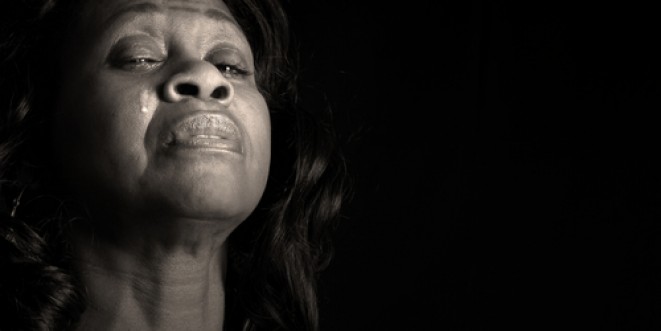The Nobility Of Suffering In Silence: Depression In Nigerian Women
By Nina OmeakuPublished: June 11, 2014

What We Think Depression Is
- A mental weakness and inability to get over one’s problems.
- A Western World problem in which people are very sad.
- A choice to be sad.
Nigerians, and many Africans in general, do not acknowledge depression as a serious ailment. We make statements such as, “We do not get depressed – that is a White man’s disease. We have bigger issues to worry about than imaginary diseases.”
This mentality could not be further from the truth. Depression is a universal disease and the existence of other, perhaps more pressing issues, such as HIV prevalence, starvation, and constant occurrences of violence make depression an even more likely occurrence. Arguably, someone experiencing these physical and external struggles may be more likely to experience long-term depression.
There are many reasons why we do not acknowledge depression as a legitimate concern, such as reliance on family and religious communities. Although, this reliance may be key to managing and ultimately recovering from depression, many times professional help must be sought in conjunction with this psychosocial support. Another very important reason for not recognizing the plight of those suffering from depression is a stigma brought on by a lack of understanding about depression.
So, what exactly is depression?
What Depression Actually Is
Depression is a common mental disorder that affects your daily life and causes pain for both you and your loved ones. More than 350 million people in the world suffer from depression.
Depression can be caused by many factors including cognitive issues, biological and genetic factors, medications, other illnesses, and environmental and situational factors. Women tend to be affected more than men.
There are 2 types of depression: unipolar depression and bipolar depression. Unipolar depression is characterized by depressive episodes, which include the following symptoms:
- A persistent sad, anxious or “empty” mood, or excessive crying
- Reduced appetite and weight loss or increased appetite and weight gain
- Persistent physical symptoms that do not respond to treatment, such as headaches, digestive disorders and chronic pain
- Irritability, restlessness
- Decreased energy, fatigue, feeling “slowed down”
- Feelings of guilt, worthlessness, helplessness, hopelessness, pessimism
- Sleeping too much or too little, early-morning waking
- Loss of interest or pleasure in activities, including sex
- Difficulty concentrating, remembering, or making decisions
- Increased risk-taking behavior, including reckless driving or substance abuse
- Thoughts of death or suicide, or suicide attempts
For an accurate diagnosis of unipolar depression, these symptoms must persist for at least 2 weeks.
An important sub-type of unipolar depression for women is postpartum depression. After childbirth many women experience hormonal changes, physical changes, and the overwhelming anxiety that can come with motherhood – this can also be a common source of depression.
The second form of depression is bipolar mood disorder which involves manic and depressive episodes separated by periods of normal mood expression. Depressive episodes are simply the symptoms of unipolar depression described above. Manic episodes entail the following:
- Excessive energy, restlessness, racing thoughts and rapid talking
- Denial that anything is wrong
- Extremely happy feelings
- Easily irritated
- Needing little sleep
- Unrealistic belief in one’s ability
- Poor judgment
- Sustained, unusual behavior
- Increased sex drive
- Substance abuse
- Aggressive behavior
- Paranoia
Manic episodes can last up to one week or longer.
How to Treat Depression
There are many methods that can be used to treat depression.
Psychosocial Support: Basic psychosocial support from loved ones may be beneficial. A peer support group of those also suffering from depression may be highly beneficial.
Psychotherapy: Therapy by a trained mental health professional can help in analyzing the source of the depression and provide healthier and beneficial methods to handle this illness.
Medication: Medication may be needed for some and research has supported its usefulness in more severe forms of depression. Treatment of children with medications should be avoided and use for adolescents should be proceeded with caution. Consult a doctor before taking any medications.
Why You Should Seek Help
You are not a machine. Your body wears and tears. Your mind runs on more than gears and wires. When you fall, it hurts. Your hormones may randomly go haywire. When misogyny, work stress, family stress, and the likes are placed on your shoulder no matter how brave of a front you may put on, it can be painful.
Regardless of how alone you may feel in your struggle or how nobly and graciously your mother, your grandmother, and other women in your life were able to “hold it together,” no (wo)man is an island. They had their own struggles, but ultimately may have felt the pressure to be “strong and silent.” Silence can be powerful, but it can also be a dam holding back a flood of painful sensations. Many of them suffered in silence. We are not obligated to condemn ourselves to the same internal imprisonment – which does nothing more than darken our light and stifle the aspirations and personal contentment we are all entitled to.
You will experience happiness, anger, sadness, and a litany of emotions in your lifetime. For many depression is an unfortunate part of these experiences. It is okay to cry. It is okay to be sad. But more importantly, if it gets to the point where it is overwhelming and is affecting your life, it is okay to ask for help.
If any of this article rings true to you I implore you to seek help. If your family and friends do not understand, do not let this stop you from pursuing the help of a professional. Do not allow yourself to be deterred in seeking your individual happiness.
Depression is not a choice and it is not a weakness. Depression is a human condition and we are only human. There is never a reason to apologize or be ashamed of our humanity.
Join the conversation. What are your views of depression as an ailment? Can one be properly treated in Nigeria (or elsewhere in Africa)?
Like what you're reading? Sign up for our free newsletter and never miss a post! Plus get a FREE digital version of our Issue No.10 with sign up.

- Dying to Be White? – The Psychological and Physical Consequences of Skin Lightening - April 22, 2014
- Evidence of Good Living or Poor Health? Why Bigger Is Not Always Better - May 7, 2014
- The Nobility Of Suffering In Silence: Depression In Nigerian Women - June 11, 2014
- Condom Scallywag and Scatter: Talking To Our Young Girls About Sex - February 9, 2015
- How to Make 2015 Your Re(New)al Year - January 7, 2015











